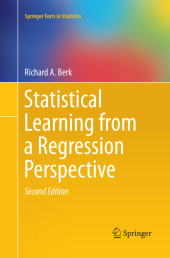 Neuerscheinungen 2018Stand: 2020-02-01 |
Schnellsuche
ISBN/Stichwort/Autor
|
Herderstraße 10
10625 Berlin
Tel.: 030 315 714 16
Fax 030 315 714 14
info@buchspektrum.de |

Richard A. Berk
Statistical Learning from a Regression Perspective
2. Aufl. 2018. xxv, 347 S. 29 SW-Abb., 91 Farbabb., 115 Farbtabellen. 235 mm
Verlag/Jahr: SPRINGER, BERLIN; SPRINGER INTERNATIONAL PUBLISHING 2018
ISBN: 3-319-82969-6 (3319829696)
Neue ISBN: 978-3-319-82969-2 (9783319829692)
Preis und Lieferzeit: Bitte klicken
This book considers statistical learning applications when interest centers on the conditional distribution of the response variable, given a set of predictors, and when it is important to characterize how the predictors are related to the response.
This textbook considers statistical learning applications when interest centers on the conditional distribution of the response variable, given a set of predictors, and when it is important to characterize how the predictors are related to the response.
This fully revised new edition includes important developments over the past 8 years. Consistent with modern data analytics, it emphasizes that a proper statistical learning data analysis derives from sound data collection, intelligent data management, appropriate statistical procedures, and an accessible interpretation of results. As in the first edition, a unifying theme is supervised learning that can be treated as a form of regression analysis. Key concepts and procedures are illustrated with real applications, especially those with practical implications.
The material is written for upper undergraduate level and graduate students in the social and life sciences and for researchers who want to apply statistical learning procedures to scientific and policy problems. The author uses this book in a course on modern regression for the social, behavioral, and biological sciences. All of the analyses included are done in R with code routinely provided.
Statistical Learning as a Regression Problem.- Splines, Smoothers, and Kernels.- Classification and Regression Trees (CART).- Bagging.- Random Forests.- Boosting.- Support Vector Machines.- Some Other Procedures Briefly.- Broader Implications and a Bit of Craft Lore.
Richard Berk is Distinguished Professor of Statistics Emeritus from the Department of Statistics at UCLA and currently a Professor at the University of Pennsylvania in the Department of Statistics and in the Department of Criminology. He is an elected fellow of the American Statistical Association and the American Association for the Advancement of Science and has served in a professional capacity with a number of organizations such as the Committee on Applied and Theoretical Statistics for the National Research Council and the Board of Directors of the Social Science Research Council. His research has ranged across a variety of applications in the social and natural sciences.


